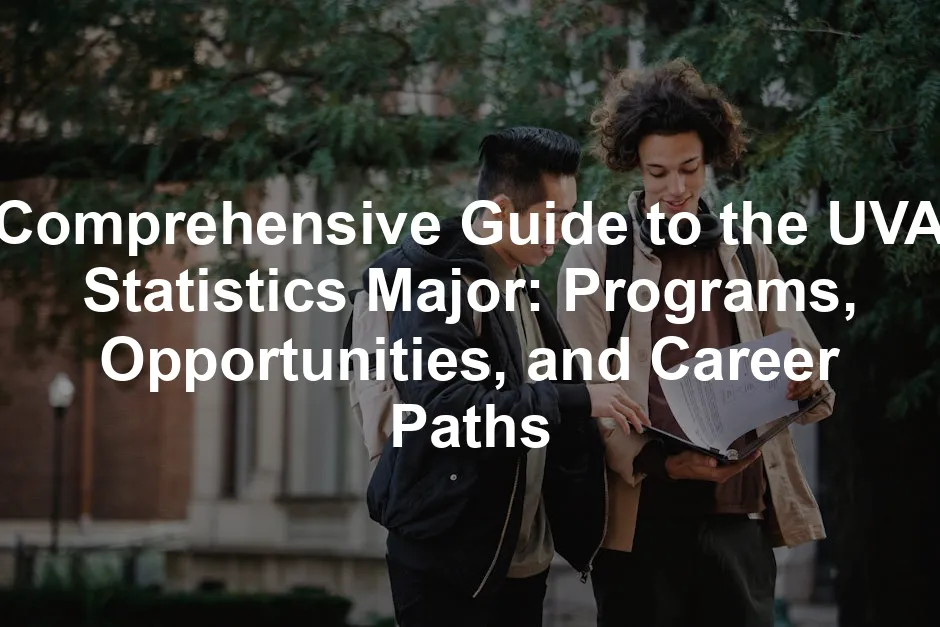Introduction
Welcome to the University of Virginia (UVA), where academic excellence meets a vibrant campus life! Known for its rigorous programs and distinguished faculty, UVA shines particularly bright in the field of statistics. The statistics major at UVA is not just about crunching numbers; it’s about turning data into stories, insights, and impactful decisions.
In our data-driven world, statistics is more crucial than ever. From healthcare to finance, and even sports analytics, statistical knowledge empowers individuals and organizations to make informed choices. Whether you’re analyzing trends, conducting research, or developing algorithms, a solid foundation in statistics opens doors to myriad opportunities.
This guide will walk you through the UVA statistics major, covering essential program details, unique concentrations, and exciting career paths. We’ll also share student experiences that highlight the vibrant community and robust support systems available. So, get ready to uncover how a statistics major can set you on the path to success!

Overview of the UVA Statistics Major
Program Options
At UVA, aspiring statisticians can choose between two primary undergraduate programs: the Bachelor of Arts (B.A.) in Applied Statistics and the Bachelor of Science (B.S.) in Statistics. Each program offers a unique approach, catering to different interests and career goals.
The B.A. in Applied Statistics is designed for students who want to apply statistical methods across various fields. This program emphasizes practical applications, making it a great fit for those interested in data analysis in areas such as business, healthcare, or social sciences. Students can choose from concentrations like Finance and Business, Biostatistics, and Data Science, tailoring their education to their passions.
The B.A. in Applied Statistics offers a practical approach to applying statistical methods across various fields. Learn more about effective data analysis.
On the flip side, the B.S. in Statistics delves deeper into the theoretical foundations of statistics. This program prepares students for advanced studies and research. It’s a great option for those looking to pursue graduate degrees in statistics or related fields. The B.S. program includes rigorous coursework that covers advanced statistical theories and methodologies.
If you’re looking to strengthen your statistical foundation further, consider picking up a copy of Statistical Methods for Psychology by David C. Howell. This book provides essential insights into statistical techniques tailored for psychology, making it a fantastic resource for understanding data analysis in this field.

Curriculum Structure
Both programs have a well-structured curriculum designed to equip students with essential statistical skills. For the B.A. in Applied Statistics, students must complete six core courses, including Data to Knowledge and Regression Analysis. Additionally, they will engage in capstone projects that emphasize practical applications of their learning.
Students pursuing the B.S. in Statistics will tackle ten core courses, including Mathematical Statistics and Linear Models. This program also features a capstone project that encourages collaboration and real-world problem solving.
Before declaring either major, students must complete several prerequisite courses. These include Calculus II, Introductory Statistics, and Introductory Programming. This foundational knowledge is critical for succeeding in advanced statistics courses.
In summary, both the B.A. and B.S. programs at UVA provide a comprehensive education in statistics, preparing graduates for diverse career opportunities. Whether you choose the applied path or the theoretical route, you’ll gain valuable skills that are highly sought after in today’s job market.

Concentrations within the Statistics Major
Overview of Concentrations
At the University of Virginia, the Bachelor of Arts (B.A.) in Applied Statistics offers three exciting concentrations: Finance and Business, Biostatistics, and Data Science. Each concentration tailors your education, preparing you for specific career paths while equipping you with vital skills.
Finance and Business: This concentration connects statistical methods with real-world financial applications. Students explore topics like financial time series, risk analysis, and market predictions. Coursework includes classes like Applied Analytics for Business and Financial Time Series and Forecasting. Graduates emerge with strong analytical skills, ready to tackle challenges in finance, investment banking, or corporate analytics.
If you want to dive deeper into data science, I highly recommend R for Data Science: Import, Tidy, Transform, Visualize, and Model Data by Hadley Wickham and Garrett Grolemund. This book is a fantastic resource for anyone looking to harness the power of R for data analysis and visualization.

Biostatistics: If your passion lies in health and medical research, this concentration is for you. Students learn to design experiments and analyze data related to health outcomes and public health. Core courses include Clinical Trials Methodology and Survival Analysis, emphasizing statistical applications in healthcare. This concentration prepares graduates for roles in pharmaceutical companies, healthcare research organizations, and government health agencies, making a real impact on public health!
Data Science: The Data Science concentration is a hot pick for students who love big data and technology. With a curriculum covering data mining, machine learning, and advanced analytics, students gain hands-on experience with tools like Python and R. Courses like Statistical Machine Learning and Exploratory Data Analysis focus on extracting insights from vast data sets. Graduates can pursue roles as data analysts, data scientists, or machine learning engineers in tech companies, consulting firms, and beyond.
Each concentration is designed to provide practical experience and theoretical knowledge, making graduates highly marketable in today’s job market.

Comparison of B.A. and B.S. Concentrations
When it comes to the B.A. versus the B.S. in Statistics at UVA, there are notable differences in core requirements and the focus of electives.
Core Requirements: The B.A. program requires six core courses, while the B.S. demands ten. This difference means B.S. students dive deeper into theoretical aspects of statistics, making it an excellent choice for those considering graduate studies. B.A. students, however, can opt for more electives, giving them flexibility to explore applied areas of interest.
Electives: The B.A. in Applied Statistics allows for four restricted electives, providing room to tailor studies. Students can choose electives from areas like Data Analysis or Computational Statistics, depending on their concentration. The B.S. requires five restricted electives, with an emphasis on advanced data analysis techniques, ensuring a robust understanding of statistical theory and methodology.
Career Path Alignment: Graduates from the B.A. program often find themselves in applied roles, such as data analysts or business consultants, where they can utilize their practical skills. In contrast, B.S. graduates are well-prepared for research-oriented positions or advanced studies in statistics, making them suitable candidates for roles in academia or industries requiring rigorous analytical skills.
In summary, both programs offer unique advantages. The B.A. emphasizes practical applications, while the B.S. focuses on theoretical foundations, allowing students to choose a path that aligns with their career aspirations.

Career Opportunities for Statistics Graduates
Industry Demand
The demand for statistics graduates is booming! As businesses increasingly rely on data-driven decisions, the need for skilled statisticians is soaring. According to recent job market trends, roles in data science are projected to grow significantly over the next decade. This growth is fueled by technological advancements and an explosion of data generated daily across all sectors.
Industries such as healthcare, finance, and technology are particularly eager to hire statistics professionals. In healthcare, biostatisticians are essential for analyzing clinical trial data, ensuring drugs and treatments are effective. The finance sector seeks analysts to assess risk and optimize investment strategies. Meanwhile, tech companies are on the hunt for data scientists who can interpret large data sets and develop algorithms that drive innovation.
Specific sectors like e-commerce, government agencies, and consulting firms also actively recruit statistics graduates. These organizations leverage statistical insights to improve customer experiences, implement policies, and streamline operations. Graduates with strong analytical skills and proficiency in programming languages are highly sought after, making a statistics degree a valuable asset in today’s job market.

In conclusion, pursuing a statistics major at UVA not only offers a strong academic foundation but also opens doors to exciting career opportunities in a variety of growing industries. As the world continues to generate and rely on data, the value of statistics graduates will only continue to rise.
Potential Job Titles and Salaries
Graduates with a statistics major from UVA can pursue a variety of exciting career paths. Here are some common job titles they often land:
- Data Analyst: Responsible for collecting, processing, and analyzing data to help organizations make informed decisions.
- Biostatistician: Vital in healthcare, this role involves designing studies and analyzing data from biological research.
- Market Research Analyst: Focuses on understanding market conditions and consumer preferences to help companies strategize effectively.
Now, let’s talk numbers! According to recent data, median salaries for these positions generally exceed national averages. For instance:
- A Data Analyst typically earns around $73,991, notably higher than the national average of $60,216 for statistics bachelor’s degree holders.
- Biostatisticians can command even higher salaries, averaging around $83,000, especially in pharmaceutical and healthcare settings.
- Market Research Analysts see median earnings of about $65,810, which is competitive across various industries.

With these promising salaries, it’s clear that a statistics degree from UVA can lead to lucrative opportunities in a booming job market.
Internships and Networking
Internships are more than just résumé fillers; they’re critical for gaining real-world experience! At UVA, students are encouraged to seek internships that provide hands-on application of their statistical knowledge. These experiences not only sharpen skills but also help students build professional networks.
Networking is key to landing those dream jobs. UVA offers numerous opportunities for students to connect with industry professionals. Career fairs are held regularly, featuring companies eager to meet statistics majors. Additionally, the alumni network is incredibly supportive. Many alumni are happy to mentor current students, providing insights and guidance that can prove invaluable.
Engaging in internships and networking events will set you apart when entering the competitive job market. So, take advantage of these opportunities while studying at UVA!

Student Experiences and Testimonials
Academic Life
Life as a statistics major at UVA is a mixed bag of challenges and rewards! Students often emphasize the rigorous coursework, which can be demanding but ultimately rewarding. Many share that while the workload can be intense, especially with certain core classes like Mathematical Statistics, the support from faculty makes a significant difference.
One student shared, “The professors genuinely care about our success. They’re approachable and always willing to help!” This sentiment is echoed across the board, as students appreciate the accessibility of faculty who guide them through complex concepts and projects.
Collaborative projects and study groups also play a crucial role in academic life. These groups foster a sense of community, allowing students to tackle tough assignments together. “Working in groups helps me grasp the material better. It’s much more fun to learn with friends!” remarked a current student.

Moreover, hands-on projects, especially during capstone courses, provide practical experience that’s vital for understanding real-world applications of statistics. Students often highlight how these projects prepare them for future challenges in their careers.
If you’re interested in a great read to complement your studies, consider The Art of Statistics: Learning from Data by David Spiegelhalter. This book offers a fascinating look at how statistics shape our understanding of the world, making it an insightful companion for your academic journey.
In summary, the academic experience for statistics majors at UVA is both challenging and enriching. With supportive faculty and a collaborative environment, students are well-equipped to succeed in their studies and future careers.

Resources for Statistics Students
Academic Resources
At the University of Virginia, students pursuing a statistics major have access to a treasure trove of academic resources. The Curry School of Education provides tutoring services to help students tackle challenging statistical concepts. Additionally, the Alderman Library houses numerous resources, including textbooks, research papers, and online databases. Need a quiet space? The library’s study rooms are perfect for cramming before exams or collaborating with peers.
Another key resource is the Statistics Help Center. This center is a go-to spot for students needing extra assistance with coursework. They offer drop-in hours where students can seek guidance and support on assignments, projects, or exam prep.
Faculty advisors play a vital role in students’ academic journeys. They help navigate course selections and provide insights into career paths. Advisors are there to lend a hand, ensuring students stay on track and make the most of their academic experience at UVA.

Online and Offline Learning Opportunities
In today’s digital age, online learning complements traditional education beautifully. Statistics students at UVA can take advantage of various online platforms, such as Coursera and edX, which offer courses on advanced statistical methods and data analysis. These courses allow students to expand their skill set beyond the classroom, often at their own pace.
If you’re keen on diving deeper into statistical learning, check out Introduction to the Practice of Statistics by David S. Moore, George P. McCabe, and Bruce A. Craig. This book is a staple for anyone looking to grasp the fundamentals of statistics and its real-world applications.

Workshops and seminars also provide excellent learning opportunities. The Sports Analytics and Statistics Laboratory (SASL) frequently hosts seminars featuring industry experts. These events cover the latest trends in statistical applications, offering students a chance to engage with real-world issues.
Students can participate in regional conferences like the Virginia Statistical Society Conference. These gatherings not only enhance learning but also provide networking opportunities with professionals in the field.
Collectively, these resources ensure that UVA statistics students are well-equipped for success. They can thrive academically while preparing for future careers in this data-driven world.

Challenges and Considerations
Common Challenges Faced by Statistics Majors
Statistics majors at UVA face a few common challenges. First, the coursework can be rigorous. Classes like Mathematical Statistics and Linear Algebra often demand substantial time and effort. Many students find themselves juggling complex concepts and a heavy workload.
Time management is another hurdle. With assignments, projects, and exams all piling up, it’s easy to feel overwhelmed. One student shared, “I had to learn how to prioritize tasks and break projects into smaller chunks to avoid last-minute panic.”
So, how can students conquer these challenges? Here are some tips based on student experiences:
- Create a Schedule: Start by mapping out your semester. Include class times, assignment due dates, and study sessions. Keeping a calendar helps you visualize your commitments.
- Join Study Groups: Collaborating with peers can lighten the load. Study groups not only provide support but also foster a sense of community. “Working with others made complex topics much easier to understand,” a student noted.
- Utilize Campus Resources: UVA offers various resources, including tutoring centers and faculty office hours. Don’t hesitate to seek help when needed. Many students found that reaching out to professors significantly improved their understanding of the material.
- Stay Organized: Keeping your notes and resources well-organized can save time and stress during exam periods. Consider using digital tools or apps to manage your study materials.
- Practice Self-Care: Balancing academics with personal well-being is crucial. Make sure to take breaks, exercise, and engage in activities you enjoy. A well-rested mind performs better!

By implementing these strategies, statistics majors can navigate their academic journey more effectively.
Planning for Graduate Studies
Many students aspire to pursue graduate studies in statistics or related fields. For those aiming for a Master of Science (M.S.) or even a Ph.D., planning is essential.
First, students should focus on completing the necessary prerequisite courses. These include foundational classes in calculus, introductory statistics, and programming, which are critical for advanced studies.
Next, gaining research experience is vital. Participating in research projects, internships, or assistantships enhances your application. “I worked as a research assistant in my junior year, which not only bolstered my résumé but also confirmed my passion for statistics,” shared a recent graduate.
When it comes to applications, crafting a strong personal statement is key. Highlight your experiences, interests, and how your undergraduate education prepared you for graduate studies. Strong letters of recommendation are equally important; ensure you build relationships with faculty who can speak to your abilities.
Finally, consider taking advantage of UVA’s unique offerings. The B.A. program allows students to complete an M.S. in just one additional year. This accelerated pathway is a fantastic option for those eager to continue their education.
In summary, by strategically planning their undergraduate years, statistics majors can set themselves up for success in graduate studies. Taking initiative now will pay off in the future!
Conclusion
In this guide, we’ve explored the landscape of the statistics major at UVA. We discussed the challenges students may face, from rigorous coursework to time management issues. However, with the right strategies, these obstacles can be navigated successfully.
We also highlighted the pathways for graduate studies, emphasizing the importance of planning and research experience. A statistics major from UVA is not just about numbers; it’s a gateway to exciting career opportunities across various industries.
To further your understanding of data science, consider reading Data Science for Business: What You Need to Know About Data Mining and Data-Analytic Thinking by Foster Provost and Tom Fawcett. This book provides essential insights into how to leverage data science for effective business strategies.
The value of a UVA statistics degree is evident. Graduates are equipped with strong analytical skills, making them highly marketable in today’s job market. So, if you’re considering a statistics major, think about how it aligns with your career aspirations. With determination and the right resources, you can thrive in this dynamic field!
FAQs
What are the prerequisites for declaring a statistics major at UVA?
To declare a statistics major at UVA, students must complete several prerequisite courses. These include: Calculus II: Courses such as MATH 1220, MATH 1320, or APMA 1110 fulfill this requirement. Introductory Statistics: Options include STAT 1100, STAT 1120, and others. Introductory Programming: Students can choose from courses like STAT 1601 or CS 1110. Foundational Statistics: Courses like STAT 3110 or MATH 3100 are required. Regression Analysis: STAT 3220 is essential before declaring. These foundational courses ensure that students are ready for the challenges of the major.
How does the B.A. in Applied Statistics differ from the B.S. in Statistics?
The B.A. in Applied Statistics focuses on practical applications of statistical methods, preparing students for careers in various fields like business or healthcare. It requires six core courses and allows for more electives. The B.S. in Statistics, however, dives deeper into theoretical concepts and rigorous methodologies. It includes ten core courses, making it an excellent choice for those considering graduate studies. Each program caters to distinct career goals and interests.
Are there opportunities for research or internships during the program?
Yes! UVA encourages students to engage in research projects and internships. These experiences are invaluable for applying theoretical knowledge to real-world problems. Many students find internships through UVA’s extensive network, often leading to job offers post-graduation.
What kind of support is available for students struggling with coursework?
UVA offers a variety of support services for students who may need extra help. Tutoring centers provide assistance in statistics and related subjects. Faculty office hours are also a great opportunity to seek clarification on difficult concepts. Additionally, counseling services are available for those needing support beyond academics.
Can students double major or minor while pursuing a statistics degree?
Yes, students can double major or minor while pursuing a statistics degree at UVA. Many opt to combine statistics with fields like economics or data science. This flexibility allows students to broaden their knowledge and enhance their employability, making them more competitive in the job market.
Please let us know what you think about our content by leaving a comment down below!
Thank you for reading till here 🙂
All images from Pexels




